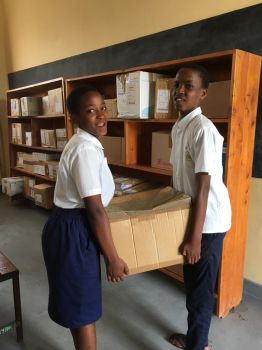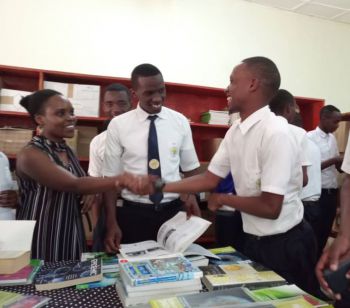Sussex researcher inspires future generations with opening of science library in Rwanda
By: Stephanie Allen
Last updated: Monday, 3 December 2018


A project led by a University of Sussex researcher has resulted in the creation of a science library in a secondary school in Rwanda.
Dr Marie-Fabrice Gasasira Uwamahoro, a research technician at the University’s world-renowned Genome Damage and Stability Centre (GDSC), launched an appeal in the summer to raise £4,000 to create a permanent resource which would encourage the next generation of scientists in her homeland.
Thanks to generous donations from across the UK, including Worth School in Crawley and Cardinal Newman Catholic School in Hove, 1,314 books covering biology, chemistry, physics and mathematics were taken to the new resource this month.
The books were delivered to Groupe Scolaire Mater Dei secondary school in Nyanza, a city in southern Rwanda, around 100km from the capital Kigali, which will be home to the science library.
The Rwandan Ministry of Education have agreed that opportunities will be made for students from other schools to use the library, meaning Dr Gasasira’s resource will inspire many more students.
Dr Gasasira said: “The reaction from the students was overwhelming. The students and the teachers were very grateful to the University of Sussex and all who made the project possible.
“The students prepared a poem they called ‘a heart full of gratitude’ in which they thank everyone for the gift of education.”
The idea for the science library came after Dr Gasasira helped to organise a science festival with students in March 2018. It came to her attention then that a lack of science textbooks and resources was an obstacle for many schools, hindering learning but also discouraging science students.
Working in collaboration with Dr Sindi Gordon, a Research Fellow in Education at the University of Sussex, Dr Gasasira decided to try and create a common space for all schools in the area to have access on a daily basis.
Dr Gasasira said: “The library is incredibly important, as supplying additional teaching and learning tools is key to promote science education and inspire a new generation of scientists.”
The project was supported by crowdfunding and the ESRC Impact Acceleration Account Fast Track Engagement Fund.
Donations are still being accepted for the science library, and every book could help inspire a student.
